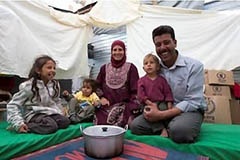The following story by Gerda Verburg, Committee on Food Security (CFS) Chair and Ambassador of the Netherlands to the UN’s Rome-based Agencies, was originally published on the Arab Spatial Food Security Blog.
With 805 million people worldwide estimated to be chronically hungry in 2012-2014, food insecurity and malnutrition in the world remains everybody’s problem. Gathering stakeholders to work together at national and regional levels can offer opportunities for the Near East region to go further in its fight against hunger.
According to the latest SOFI report, the Near East region is lagging behind in efforts to reduce hunger: in 1990-1992, the number of undernourished people in Western Asia and Northern Africa were respectively 8 million and 6 million; in 2012-2014, this number has increased to 19 and 13 million. Even more importantly, the share of undernourished people has also increased between this dates, from respectively 0.8% and 0.6% in 1990-1992, to 2.3% and 1.6% in 2012-2014.
The obstacles faced by Near East countries in reducing food insecurity and malnutrition result from a complex combination of factors. Per capita arable land and water availability are among the lowest in the world and expected to worsen with population growth and climate change. Countries of the Near-East rely dramatically on food imports [1] and as a result, are more vulnerable to increases in world food prices and price volatility. Adding to these challenges, the Near East region counts among the greatest number of countries facing political instability and protracted crises.
It is necessary to acknowledge the two-way relation between political stability and food security. While the relation between food riots and political instability is often stressed, as having led to what many called “the Arab Spring”, the reversed impact of political instability on people’s food security, for instance in Yemen [2], Sudan, Iraq, West Bank and Gaza Strip (WBGS), Syria [3] and its neighbors, is at least as dramatic. There can be no durable peace without food security and no sustainable food security without peace.
The fight against hunger cannot be won alone. The number of hungry, under- and malnourished people in the region and the complexity of cumulating (natural and man-made) factors make it particularly strategic for these countries to address the issue in a comprehensive and integrated way. I commend IFPRI and the UN for the excellent initiative of this blog. This blog, targeting policy makers, analysts, media, as well as a wide range of stakeholders, is in full line with the approach of the Committee on World Food Security (CFS), the world’s foremost multi-stakeholder platform on issues related to FSN, and I am delighted that CFS’s 41st plenary session is hosting its launch.
Since its reform in 2009, CFS, jointly supported by all three Rome-Based UN agencies, gathers member countries, other UN organisations, civil society and NGOs, private sector companies, global research institutions and philanthropic organisations, has undertaken this challenge and is addressing some of the most topical policy issues of the region.
Acknowledging that reinforcing food security implies enhancing productivity, through more and better investment, CFS members and participants have worked hard for more than 2 years to negotiate the “Principles for Responsible Investments in Agriculture and Food Systems”. Once endorsed by Plenary, the principles will be a reference to foster investment in the agricultural and food sector to strengthen national food security and nutrition.
The Near East is particularly vulnerable to climate change and to price volatility. Social protection can play an important role to improve food security and nutrition. On these three topics CFS has already made recommendations, based on reports from its High Level Panel of Experts (HLPE). It will discuss this year Food Losses and Waste which has been identified by the Near East Regional FAO Conference as a major issue to be addressed to reduce pressure on scarce natural resources. Next year, CFS will discuss the issue of Water and Food Security, which is another major topic of interest for the region. The V0 version of the HLPE report which will inform the CFS has just been submitted to public consultation.
Addressing, in protracted crises, the key relation between resilience and food security, is another priority of CFS. With its draft “Agenda for Action for Addressing Food Insecurity in Protracted Crises”, CFS seeks to address the gap between humanitarian aid and development assistance, and to get stakeholders to work together to increase long-term resilience of livelihoods. This issue is of paramount importance to Near-East countries, and I expect very active participation from actors of the region next year.
CFS, just as food security and nutrition, is everyone’s business. Here in Rome, we are doing our utmost to coordinate global policy, creating and offering policy tools to support governments and stakeholders in their fight against hunger.
I trust that readers of this blog will be inspired by the opportunities at hand by joining forces with other stakeholders, different networks, at national and regional level, and I sincerely hope that the Near East will soon have new success stories to share with the rest of the world.
[1] In 2006-10 the region imported 47% of cereals needed, 72% of vegetable oils and 60% of sugar [2] Over 44% of the population is food insecure [3] Where 6.3 million people are highly vulnerable and in critical need of sustained food and agricultural assistance, Fact Sheet Regional Conference for the Near East (NERC 32)







